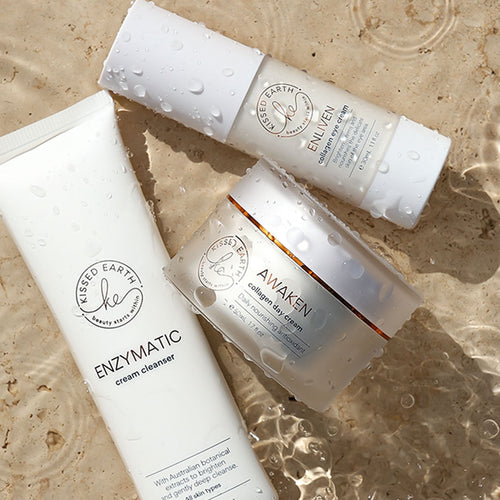Collagen’s getting a lot of attention lately, but the part that many people miss is that there’s more than one kind. Each type supports your body in slightly different ways, so knowing the difference can actually help you choose one that matches your goals. If you’re aiming for stronger joints or smoother skin, the type you pick matters. This guide breaks it down so you’re not guessing next time you’re looking at a supplement label.
When you’re reading a label wondering what all those ingredients mean, it helps to know what each one does. Understanding the different types of collagen supplements will help you pick something that lines up with what you’re hoping to improve.
This is the most common type found in the body and is a popular one for skin support. It’s usually sourced frommarine collagen peptides and is a solid pick if you’re keen to improve your skin elasticity. Type I collagen is a good choice when you want to reduce fine lines and give your nails and hair some strength.
You’ll often see this one teamed up with Type I, especially in beauty blends or ones focused on improving gut health. It’s commonly sourced frombovine collagen peptides and helps keep skin looking firm and supple. However, type III is often chosen for improving gut lining and circulation.
Most supplements these days use hydrolysed collagen or collagen peptides. That just means the collagen has been broken down into smaller bits that are easier for your body to absorb.Collagen protein powders are the most common form, and you can stir them into water, coffee, or a smoothie to start your day. You’ll also see collagen in ready-to-eatcollagen protein bars that are perfect for when you’re feeling snacky.
Bovine collagen peptides, sourced from cowhide, are one of the most widely used options. They’re rich in Type I and III, which support skin elasticity, gut lining, and joint health. Then there’s marine collagen peptides, usually taken from fish skin and scales, which are mostly Type I—the one most linked to smoother skin, stronger nails, and shinier hair. Some people prefer marine collagen because it’s absorbed a bit faster, and is a good option if you’re avoiding beef-based products.
Have a look at any health store and you’ll spot several types of collagen supplements, each promising a different thing on the label. Here’s how to find the right fit for your goals:
For skin health and anti-ageing
Type I collagen is the most common pick for anyone wanting to keep their skin firm. It works by supporting the skin’s natural elasticity to help smooth out any fine lines. Noticed your hair or nails feeling weaker? This type can lend some support there too, all while improving your skin’s overall texture.
For joint health and mobility
Type III collagen focuses on the cartilage that cushions your joints, which can wear down with time or activity. This type helps ease stiffness and supports flexibility, making it easier to move comfortably. Even if you don’t have joint problems like osteoarthritis but feel sore after a workout, this type can help. It’s also perfect for staying active and managing everyday joint discomfort.
For gut and overall wellness
Type III collagen plays a key role in supporting the lining of your gut and keeping blood vessels healthy. It’s an excellent option if your digestion has been off lately or you want to boost your general wellbeing. Plus, it works alongside Type I to help maintain skin health, making it a two-in-one choice if your goal is to feel good inside and out.
For bone strength and repair
Types I and III team up to give your bones the nutrients they need to stay strong and repair themselves when needed. When you’re recovering from an injury or just keen on keeping your bones solid, this combo helps keep you steady on your feet. It’s especially handy if you want to stay active or have dealt with bone issues before.
Choosing between the various types of collagen supplements isn’t only about picking the right type. A few other details can change how well it works for you. Hydrolysed collagen or collagen peptides are broken down into smaller chains of amino acids, making it easier for your body to absorb and use. It only works if your body can actually process it, so that part’s worth paying attention to.
Some supplements add extras, such as vitamin C, hyaluronic acid, or zinc, because these can help your body build collagen more efficiently. They also have the added bonus of supporting skin hydration and overall health.
Of course, if you have dietary preferences or restrictions, those also play a part. Marine collagen fits well for pescatarians as it offers a strong source of Type I collagen without relying on land animals. On the other hand, if you avoid animal products altogether, bovine collagen won’t fit your lifestyle, so it’s good to check labels carefully. Some people turn to medicinalmushrooms instead, since they’re known to support immune function and are a great alternative to improve your wellbeing.
At the end of the day, finding the right type comes down to knowing what you want to support and how your body responds best. With so many types of collagen supplements out there, a bit of label-reading can go a long way.
Type I collagen is your go-to for firmer, smoother skin, and it’s also the most abundant type in your body. It helps with skin elasticity and can support hair and nail strength.
Most people start noticing changes after about 4 to 6 weeks, but it can vary depending on your body and what you’re taking it for. Just remember that being consistent helps and using it daily will give you the best results.
Yes, many supplements actually combine types I and III depending on the focus. Taking more than one type can be helpful if you want to support your skin, joints, and gut health all at once.
Not necessarily better, but just different. Marine collagen is mostly Type I and tends to absorb a bit quicker, while bovine has both Type I and III, which makes it more well-rounded.
Most people tolerate different types of collagen supplements well, but some might experience mild bloating or digestive discomfort, especially when first starting out. This usually settles down once your body adjusts but if something feels off, check the ingredient list for any additives or allergens, and have a chat with your healthcare provider.

Enter your details to enjoy 20% off your first order + exclusive promos and recipes monthly.


